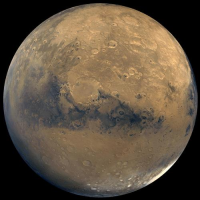India Beats China to Mars
 The red planet (photo: NASA)
The red planet (photo: NASA)
India has made history by becoming the first country to enter the orbit of Mars on its maiden attempt. The Indian Space Research Organisation (ISRO) successfully inserted the spacecraft Mangalyaan (‘Mars craft’) into the red planet's orbit on Wednesday, following its 11-month journey from Earth.
"History has been created today," said Prime Minister Narendra Modi, who was at ISRO centre in Bengaluru to witness the event. He congratulated ISRO scientists for the landmark success.
"We have dared to reach out into the unknown and have achieved the near impossible," Modi told the scientists.
The Rs. 450 crore ($75 million) Mars Orbiter Mission (MOM) was launched on November 5, 2013, via the indigenous PSLV rocket from the country's spaceport at Sriharikota, about 80 km northeast of Chennai.
The five scientific instruments on board the 475-kg orbiter will study the Martian surface and its mineral composition as well as scan its atmosphere for methane gas, an indicator of possible life on Mars.
The Mars orbit insertion began at 4.17 am on Wednesday morning when the spacecraft switched over to the medium gain antenna for emitting and receiving radio signals.
"The spacecraft was successfully inserted into the Martian orbit at 515 km away from the red planet's surface and 215 million km away from the earth in radio distance," a senior ISRO official said.
Mangalyaan is expected to orbit Mars for six months and send data back to Earth until its fuel supplies are exhausted, according to ISRO.
India joins the space elite of U.S., Europe and Russia in orbiting Mars, having beaten China to the red planet. According to NASA, about half of the 43 missions to Mars over the last five decades have failed, including the attempts by China (2011) and Japan (1998).
Both India and China are competing in space – India’s unmanned Chandrayaan mission to the moon in 2009 showed water formation there may be occurring, while China plans to complete a manned space station by 2022.
India launched its space programme five decades ago and developed indigenous rockets after sanctions were imposed on it for conducting nuclear tests in 1974 and 1998.
ISRO has so far launched 40 foreign satellites, many of them for developed countries like Britain, Canada, Germany and France. The space agency offers cost-effective launch services that provide a niche in an increasingly competitive international market.
“This mission (MOM) costs less than it takes to make a Hollywood movie,” Modi said on Wednesday. The prime minister pointed out that ISRO used a smaller rocket and payload to reduce costs.
The development cost of Mangalyaan was a mere 11 percent of NASA’s orbiter MAVEN that reached Mars orbit on Sunday.
“This is a big step,” said B.N. Raghunandan, a former chairman of the aerospace engineering department at the Indian Institute of Science. “People will see India as a destination for high-end projects,” he told Bloomberg.
- Karan Singh
To Learn More:
India Beats China to Mars Orbit at 11% Cost of U.S. Probe (by Ganesh Nagarajan, Bloomberg)
Mars Orbiter Mission successfully enters Red Planet orbit (India Today)
India's Mars satellite successfully enters orbit, bringing country into space elite (by Jason Burke, The Guardian)
India’s Spacecraft Nears Martian Atmosphere (by Karan Singh, AllGov India)
- Top Stories
- Controversies
- Where is the Money Going?
- India and the World
- Appointments and Resignations
- Unusual News
- Latest News
- India College Chain’s Expansion into U.S. Draws Opposition from Massachusetts Officials over Quality of Education
- Milk Shortages in India Tied to Release of New Movies Featuring Nation’s Favorite Stars
- Confusion Swirls around Kashmir Newspaper Ban in Wake of Violent Street Protests
- Polio-Free for 5 Years, India Launches Vaccine Drive after Polio Strain Discovery
- New Aviation Policy Could Increase Service, Lower Ticket Prices






Comments